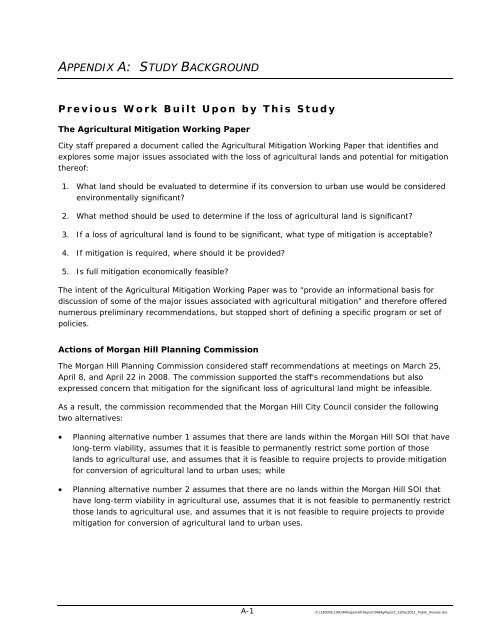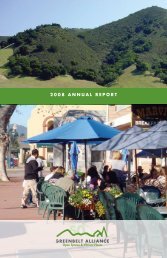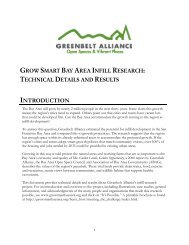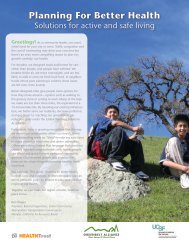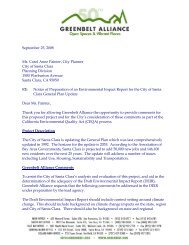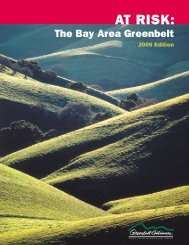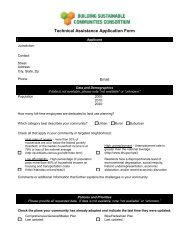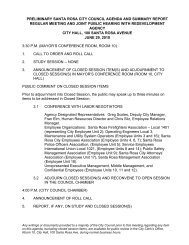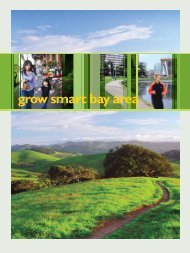Morgan Hill Agricultural Policies and Implementation Program
Morgan Hill Agricultural Policies and Implementation Program
Morgan Hill Agricultural Policies and Implementation Program
You also want an ePaper? Increase the reach of your titles
YUMPU automatically turns print PDFs into web optimized ePapers that Google loves.
APPENDIX A: STUDY BACKGROUND<br />
Previous Work Built Upon by This Study<br />
The <strong>Agricultural</strong> Mitigation Working Paper<br />
City staff prepared a document called the <strong>Agricultural</strong> Mitigation Working Paper that identifies <strong>and</strong><br />
explores some major issues associated with the loss of agricultural l<strong>and</strong>s <strong>and</strong> potential for mitigation<br />
thereof:<br />
1. What l<strong>and</strong> should be evaluated to determine if its conversion to urban use would be considered<br />
environmentally significant<br />
2. What method should be used to determine if the loss of agricultural l<strong>and</strong> is significant<br />
3. If a loss of agricultural l<strong>and</strong> is found to be significant, what type of mitigation is acceptable<br />
4. If mitigation is required, where should it be provided<br />
5. Is full mitigation economically feasible<br />
The intent of the <strong>Agricultural</strong> Mitigation Working Paper was to “provide an informational basis for<br />
discussion of some of the major issues associated with agricultural mitigation” <strong>and</strong> therefore offered<br />
numerous preliminary recommendations, but stopped short of defining a specific program or set of<br />
policies.<br />
Actions of <strong>Morgan</strong> <strong>Hill</strong> Planning Commission<br />
The <strong>Morgan</strong> <strong>Hill</strong> Planning Commission considered staff recommendations at meetings on March 25,<br />
April 8, <strong>and</strong> April 22 in 2008. The commission supported the staff's recommendations but also<br />
expressed concern that mitigation for the significant loss of agricultural l<strong>and</strong> might be infeasible.<br />
As a result, the commission recommended that the <strong>Morgan</strong> <strong>Hill</strong> City Council consider the following<br />
two alternatives:<br />
• Planning alternative number 1 assumes that there are l<strong>and</strong>s within the <strong>Morgan</strong> <strong>Hill</strong> SOI that have<br />
long-term viability, assumes that it is feasible to permanently restrict some portion of those<br />
l<strong>and</strong>s to agricultural use, <strong>and</strong> assumes that it is feasible to require projects to provide mitigation<br />
for conversion of agricultural l<strong>and</strong> to urban uses; while<br />
• Planning alternative number 2 assumes that there are no l<strong>and</strong>s within the <strong>Morgan</strong> <strong>Hill</strong> SOI that<br />
have long-term viability in agricultural use, assumes that it is not feasible to permanently restrict<br />
those l<strong>and</strong>s to agricultural use, <strong>and</strong> assumes that it is not feasible to require projects to provide<br />
mitigation for conversion of agricultural l<strong>and</strong> to urban uses.<br />
A-1 P:\19000s\19014<strong>Morgan</strong><strong>Hill</strong>\Report\MHAgReport_22Dec2011_Public_Review.doc


